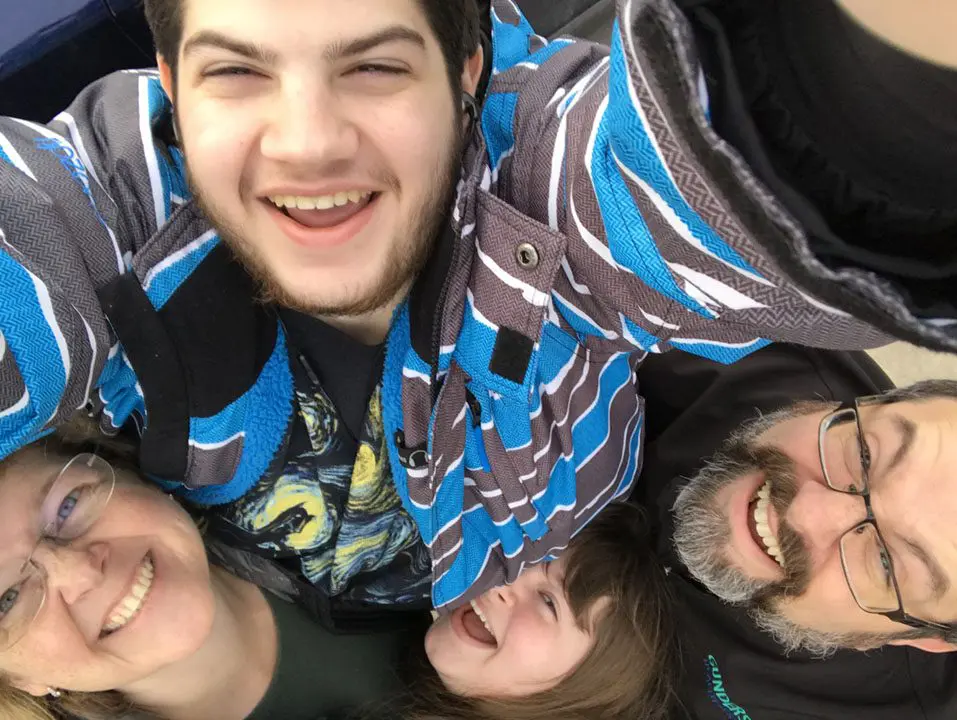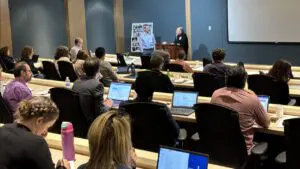This week, approximately 70 cancer specialists from U.S. and international research institutions gathered in Greenwich, Connecticut to collaborate share research information about fibrolamellar carcinoma (FLC). For the 5th time, the Fibrolamellar Cancer Foundation sponsored an international symposium designed to bring together the community of researchers investigating FLC, foster deeper collaboration among those teams, and accelerate progress towards a cure for the devastating disease. FCF extends special thanks to Genentech and Blueprint Medicines, two corporate sponsors that helped defray some of the costs of hosting the event.
On Monday, April 24, the event was kicked off by a series of keynote discussions, featuring:

- Marna Davis – Co-chairman of FCF
- Ethan Neumann – a FLC patient
- Razelle Kurzrock, MD – an experienced clinician with extensive experience in rare disease treatment and precision cancer medicine
- Daniel Short, MD, PhD – a FLC caregiver.
These powerful testimonies about the personal impact of the disease and the promise of precision medicine set the stage for the detailed scientific discussions that began the next morning. Individual perspectives, challenges and opportunities were shared. A video of those keynote talks can be viewed here and in FCF’s YouTube channel.
The balance of the symposium was held under a confidentiality agreement. As always, the organization of this event creates a dilemma – how to balance the desire to openly share information with the need to respect the confidentiality of information before it is published. FCF strongly believes that deep collaboration between institutions is essential to accelerating progress against this disease. Given the long time lag between a research discovery and its publication in a peer-reviewed scientific journal, holding private meetings like this under confidentiality agreements can free investigators to share data before it is widely available and therefore accelerate developments. It also means that anyone sharing any information about other investigator’s presentations at the meeting has broken a legal agreement and risks jeopardizing future collaborations between researchers. Respecting these confidentiality agreements is essential to maintaining research momentum in our disease.
The “closed access” session included discussions about FLC disease models, signaling pathways, potential targeted drug therapies, immunotherapy approaches, disease incidence and clinical trial results. Presenters included investigators from
- Boston Children’s Hospital
- Cincinnati Children’s Hospital
- Cornell University
- Fred Hutchinson Cancer Center
- INSERM
- Johns Hopkins
- Massachusetts General Hospital
- Memorial Sloan-Kettering
- MD Anderson Cancer Center
- Princess Maxima Center
- St. Jude Children’s Research Hospital
- University Hospital Tubingen
- UCSF
- UCSD
- UNC
- University of Washington
- … and others.
FCF is encouraged and amazed by the vast strides that the research community is making. The understanding of the mechanistic impacts of the DNAJB1-PKACA fusion is improving, new insights into how the fusion protein is transforming tumor cells are emerging, and potential targets to stop the disease are being explored. At the same time immunotherapy approaches against FLC are showing early promise.
FCF is also gratified by the research community’s willingness to truly collaborate. We are committed to support that collaboration, through grant-making, active partnership, infrastructure coordination and resource support. FCF is currently exploring ways to substantially increase its financial support and help drive the translation of promising research into the clinic. Together with the research and clinical community, we believe that we can accelerate progress and lay the groundwork for new, more effective FLC treatments.

